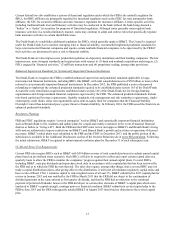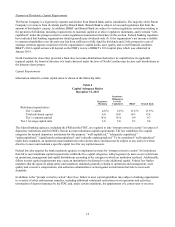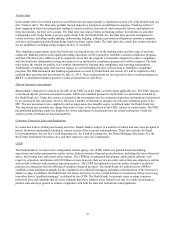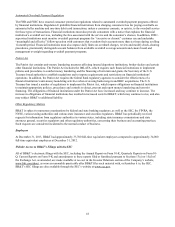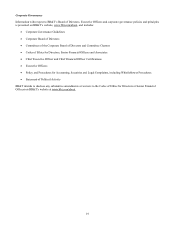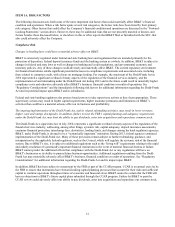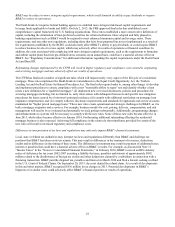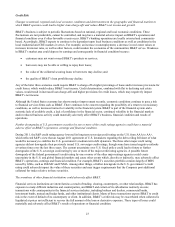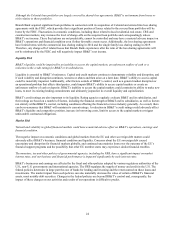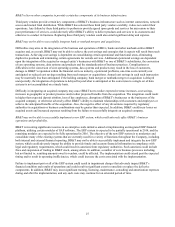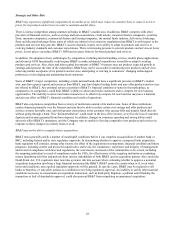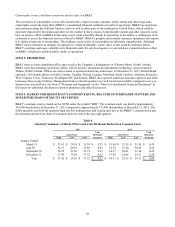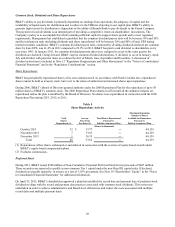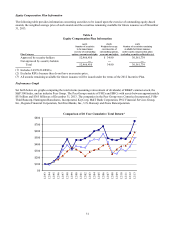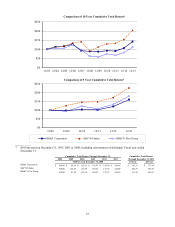BB&T 2013 Annual Report Download - page 22
Download and view the complete annual report
Please find page 22 of the 2013 BB&T annual report below. You can navigate through the pages in the report by either clicking on the pages listed below, or by using the keyword search tool below to find specific information within the annual report.22
BB&T may be subject to more stringent capital requirements, which could diminish its ability to pay dividends or require
BB&T to reduce its operations.
The Dodd-Frank Act requires federal banking agencies to establish more stringent risk-based capital requirements and
leverage limits applicable to banks and BHCs. On July 2, 2013, the FRB approved final rules that established a new
comprehensive capital framework for U.S. banking organizations. These rules established a more conservative definition of
capital, including the elimination of trust-preferred securities for certain institutions. Once adopted and fully phased in,
banking organizations such as BB&T would be required to meet enhanced minimum capital and leverage ratios. These
requirements, and any other new regulations, including those that have been proposed but not yet implemented as a result of
the requirements established by the BCBS, could adversely affect BB&T’s ability to pay dividends, or could require BB&T
to reduce business levels or to raise capital, which may adversely affect its results of operations or financial condition. In
addition, the costs associated with complying with more stringent capital requirements, such as the requirement to formulate
and submit capital plans based on pre-defined stress scenarios on an annual basis, could have a material adverse effect on
BB&T. See “Regulatory Considerations” for additional information regarding the capital requirements under the Dodd-Frank
Act and Basel III.
Rulemaking changes implemented by the CFPB will result in higher regulatory and compliance costs related to originating
and servicing mortgages and may adversely affect our results of operations.
The CFPB has finalized a number of significant rules which will impact nearly every aspect of the lifecycle of a residential
mortgage. These rules implement the Dodd-Frank Act amendments to the Equal Credit Opportunity Act, the Truth in
Lending Act and the Real Estate Settlement Procedures Act. The final rules require banks to, among other things: (i) develop
and implement procedures to ensure compliance with a new "reasonable ability to repay" test and identify whether a loan
meets a new definition for a "qualified mortgage;" (ii) implement new or revised disclosures, policies and procedures for
servicing mortgages including, but not limited to, early intervention with delinquent borrowers and specific loss mitigation
procedures for loans secured by a borrower's principal residence; (iii) comply with additional restrictions on mortgage loan
originator compensation; and (iv) comply with new disclosure requirements and standards for appraisals and escrow accounts
maintained for "higher priced mortgage loans." These new rules create operational and strategic challenges for BB&T, as it is
both a mortgage originator and a servicer. For example, business models for cost, pricing, delivery, compensation, and risk
management will need to be re-evaluated and potentially revised, perhaps substantially. Additionally, programming changes
and enhancements to systems will be necessary to comply with the new rules. Some of these new rules became effective in
June 2013, while others became effective in January 2014. Forthcoming additional rulemaking affecting the residential
mortgage business is also expected. Achieving full compliance in the relatively short timeframe provided for certain of the
new rules will result in increased regulatory and compliance costs.
Differences in interpretation of tax laws and regulations may adversely impact BB&T’s financial statements.
Local, state or federal tax authorities may interpret tax laws and regulations differently than BB&T and challenge tax
positions that BB&T has taken on its tax returns. This may result in differences in the treatment of revenues, deductions,
credits and/or differences in the timing of these items. The differences in treatment may result in payment of additional taxes,
interest or penalties that could have a material adverse effect on BB&T’s results. For example, as discussed in Note 12
“Income Taxes” in the “Notes to Consolidated Financial Statements,” in February 2010, BB&T received an IRS statutory
notice of deficiency for tax years 2002-2007 asserting a liability for taxes, penalties and interest of approximately $892
million related to the disallowance of foreign tax credits and other deductions claimed by a subsidiary in connection with a
financing transaction. BB&T paid the disputed tax, penalties and interest in March 2010 and filed a lawsuit seeking a refund
in the U.S. Court of Federal Claims. On September 20, 2013, the court denied the refund claim. As a result of developments
in this and other matters, BB&T recognized $516 million in tax charges in 2013. Potential developments in BB&T’s
litigation or in similar cases could adversely affect BB&T’s financial position or results of operations.


